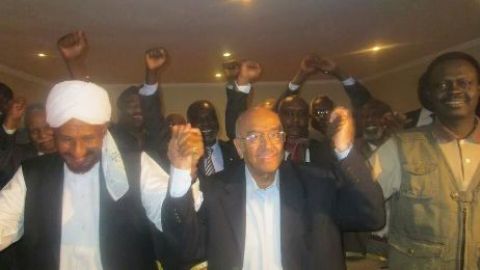Sudan’s Bashir vows to quash rebellion by end of the year
December 13, 2014 (KHARTOUM) – Sudanese president Omer Hassan al-Bashir has accused leaders of opposition parties allied with the rebel umbrella Sudan Revolutionary Front (SRF) of being agents of foreign powers and warned them against returning to the country.

The agreement was signed by the head of the National Consensus Forces (NCF), Farouk Abu Issa, deputy chairman of the SRF Minni Minnawi, leader of the National Umma Party (NUP) al-Sadiq al Mahdi and head of the Alliance of the Sudanese Civil Society Organisations, Amin Maki Madani.
Bashir, who addressed a gathering of farmers from Gezira scheme on Saturday, described the opposition parties allied with the SRF as “agents and mercenaries”.
“Yes, I say loudly they are mercenaries. SRF fought alongside forces loyal to Libya’s former leader Muammer al-Ghadafi during the Libyan revolution for money and they are fighting in the ongoing conflict in South Sudan for money also,” he said.
He added that leaders of the SRF have “sold themselves to the enemies of Sudan”, saying he who wants to align with them should stay abroad and meet us in the battlefields in South Kordofan, Blue Nile and Darfur.
Last week, the Sudanese security apparatus arrested Abu Issa, and Madani besides former ruling National Congress Party (NCP) member, Farah Agar, and his office manager, Mohamed Eldoud after their return from Addis Ababa where they signed the Sudan Call with rebel groups.
Bashir further said the army and the other regular forces will declare the country “free of insurgency” by the end of the year.
“Those (rebel leaders) who live in hotels abroad and spend money and seek to sabotage Sudan, we tell them there will be no insurgency in the country any more beyond this year, everything must come to an end,” he added.
The Sudanese army has been fighting rebels in Blue Nile and South Kordofan since 2011 and Darfur rebels since 2003.
Bashir underscored they will continue to extend their hands to the opposition to achieve peace but warned that they will not sign any new agreement with rebel groups.
“We won’t sign any new agreement. Regarding the Darfur [problem] we have the Doha peace accord and it is a final agreement; those who want to sign it [are welcome] and those who refuse to sign shall meet us in the battlefield,” he added.
He reiterated that his government will not combine the issues of the Two Areas and Darfur in one forum, saying the former must be negotiated according to arrangements included in the 2005 comprehensive peace agreement.
Bashir also stressed they wouldn’t accept to discuss issues of Shari’a law and self-rule in Addis Ababa talks with the rebel Sudan People’s Liberation Movement-North (SPLM-N).
Earlier this month, the African Union mediation announced suspension of the ninth round of talks between the Sudanese government and the SPLM-N on the Two Areas in Addis Ababa.
Negotiations stalled after the government delegation insisted that the objective of talks is to settle the conflict in the Two Areas, while the SPLM-N team has called for a holistic approach to resolve ongoing conflicts across Sudan.
Bashir emphasised his government’s seriousness to proceed with the national dialogue initiative to bring the Sudanese people to agree on fundamental national issues in order to achieve political stability.
He stressed they would only relinquish power through ballot box, saying those who seek to change the regime should work hard to win the election.
UNAMID IS “WEAK”
Bashir described the hybrid peacekeeping mission in Darfur (UNAMID) as “weak”, saying its troops are being protected by the Sudan Armed Forces (SAF).
“That is why we said to them goodbye and thank you and may Allah reward you [for your efforts]”, he said.
He underscored that no one could impose his point of view on the Sudanese government regarding the decision to expel the mission.
Differences between the Sudanese government and the UNAMID have escalated following the former’s decision not to allow the latter conduct a second inquiry on the alleged rape of some 200 women and girls by the Sudanese soldiers in Tabit, a village 45km south-west of the North Darfur capital, El-Fasher.
On 21 November, Sudan said it asked the UNAMID to put in place an exit strategy from the restive region.
CHINA AND WHEAT EXPORTS
The Sudanese president further denied existence of any political agenda or pre-conditions governing Sudan’s relations with China, saying they have true partnership with Asian giant.
China has been Sudan’s largest foreign investor particularly in oil and telecommunications after western firms shunned the East African nation due to conflicts and sanctions.
Bashir said Sudan will soon export wheat to all nations of the world, pointing his country has vast land resources which could be utilised for international food security.
He revealed the country will see large agricultural investments in the coming period.
On Friday, the Russia Today (RT) website said the Sudanese ministry of commerce asked Russia to open a line of credit line to finance two million tonnes of wheat imports from Russia to Sudan.
Sudan imports more than two million tonnes of wheat annually at a cost of $1.5 billion dollars. The government plans for achieving self sufficiency has failed since 1993 while domestic consumption have increased significantly.
(ST)
